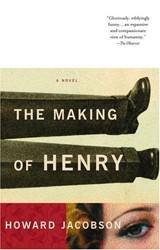“If you wrong us, shall we not revenge?” Shylock laments in The Merchant of Venice, animating Howard Jacobson’s contemporary reimagining of the Shakespeare play. Jacobson is the perfect choice for this task. Besides writing celebrated novels about Jews — among them, most recently, J. and the Man Booker Prize-winning The Finkler Question—he taught classic literature at British universities for several years.
Jacobson’s twenty-first-century Shylock is Simon Strulovitch: not a money-lender like Shakespeare’s protagonist, but a philanthropist with a special interest in Anglo-Jewish art. Strulovitch’s daughter Beatrice, like Shylock’s Jessica, runs away from home, fleeing her Jewishness too. Strulovitch has only a passing acquaintance with Judaism himself, but he becomes apoplectic at the thought that his daughter would marry a non-Jew. It drives him to a rage that he can’t rationally explain but which pushes him to extremes.
Readers who know The Merchant of Venice will recognize other characters’ identities in their modern guises. Antonio the merchant has become d’Anton the art dealer. Shakespeare’s Portia; who renders judgment while impersonating a law clerk, here decides disputes as a television reality-show personality named Plurabelle.
In Jacobson’s most brilliant stroke, Shylock himself appears as a tutelary spirit, a revenant who embodies moral clarity amid people more influenced by privilege, wealth, and prejudice. Where others are content with the superficial and transitory, Shylock’s eloquence brings gravitas to enduring questions of justice and compassion.
The “pound of flesh” reappears in this version of the story in a brilliant way that may shock or delight readers with its aptness. The “quality of mercy” speech is here too, though on the lips of an unexpected character. These bold departures from Shakespeare make this retelling much more than a simple transposition of a classic story. It asks profound questions of its own about the persistence of Jewish singularity and the trajectory of religious belief.
Shylock observes that “Christians are so anxious to accommodate to the modern that they have stopped listening to an ancient injunction. They sing carols and call it faith. Before long there will be none of them left.” As for Jews, Strulovitch muses that “Jews have grown so careful now. If you wrong us, shall we not revenge? No, we shall not. We shall take it on the chin and be grateful. Unless we’re in Judea and Samaria, where we’re accused of being Nazis. Cowards or Nazis — which was it to be?”
Shylock Is My Name is the second in a series of commissions by the Hogarth Press for the 400th anniversary of Shakespeare’s death, which falls in 2016. (Jeanette Winterson’s The Gap of Time, based on The Winter’s Tale, was the first.) Much more than an updating of a centuries-old story, Howard Jacobson’s new novel stands as an independent work that brings comedy, passion, commitment, and challenging ideas to bear on the concerns of our own time. This entertaining, provocative work is not to be missed.
Related Content:




